- Bernard Preston homepage
- Our green garden
- Lucky Not to Have a Gardener
Lucky not to have a gardener
We are so lucky not to have a gardener; this blog is about the joy of doing it all yourself.
For something different read Prue Leith’s take on an English garden[1] in The Telegraph. She emigrated from SA about fifty years ago and is now eighty. Obviously well-heeled and with rands that actually would have been worth some pounds, together with her husband she bought a home in the Cotswolds.
It’s
an entertaining read on the unpredictability of growing your own food; and how
gardening can be all hard work and disappointment.

She took however her SA roots with her to their new home. Says she, “I’ve always been lucky enough to have a gardener.”
That got me thinking. I have decided that I am lucky enough not to have a gardener. Well, that’s not entirely true. Unlike Prue whose husband, a writer "seldom ever leaves the study" the good-wife here is every bit as committed; perhaps even more so.
Whilst it’s true that gardening does have an unpredictable side, I am glad to be able to boast about being the only man in the whole world who gets fresh-roses, or at the moment huge bunches of delightful poppies in my office; every working day of my life from the good wife.
Her flowers are very predictable.
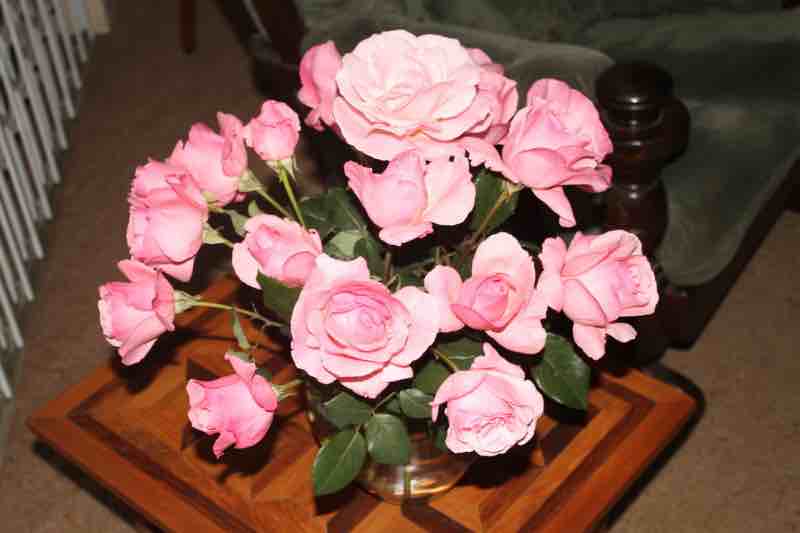
And I’m happy to say the mulberry trees have once again brought us and the entertaining Louries buckets of delicious, fresh fruit; and a host of other birds to party with them.
Lemons and limes abound but I must admit though that I have been battling to find and pick the twenty avocados[2] a week that we are accustomed to for nine-months of the year; we think the tornado that brushed the village knocked a lot of the flowers off.
One crop that was completely unpredicted was the nectar-flow this last spring; thanks perhaps to the astonishing hail storm in June this has been a truly amazing season. Having 170 bottles already safely harvested, with the promise of more to come has been a total surprise; surpassing any previous robbing that I recall in October.
Do we harvest the honey or rob the bees?
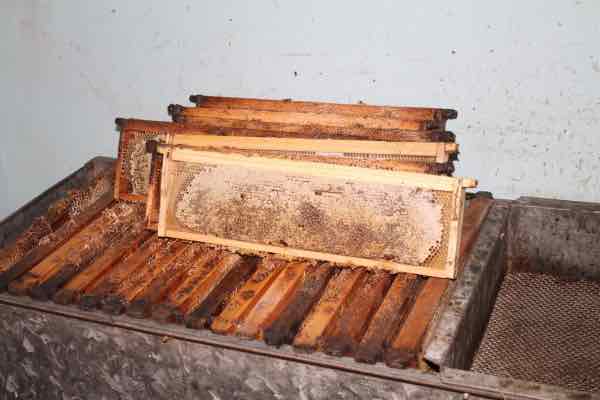
On the subject of bees this is the season to treat them with great respect. A "boiling hive" means when you lift the lid with alternative shopping in your heart, they come pouring out to defend the fruit of their labours. Twice I have literally been chased from the apiary so angry were they; but that doesn’t happen very often. Still they are positively dangerous at the moment.
Since childhood we have spoken of "robbing the bees" but it's no longer politically-correct. I too like strong words that mean something but in fact it is not a good fit; it does not reflect the give and take which characterises how the keeper feels about his pets. So we harvest the honey. Would a rose smell any different if you gave it another name?
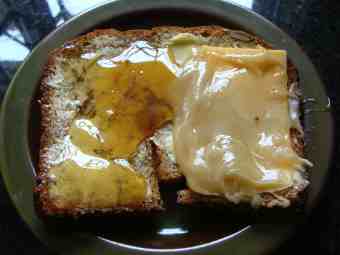
No it would not smell or taste any different but saying that we rob the bees lends weight to the vegans' belief that we should not eat honey; and that the keeper is a vagabond who exploits nature in a vile way.
So we harvest the
honey and give as much and more back to our much-loved pets. In exchange they have a warm,
dry home with clean wax for the queen to lay her eggs in; and food in a dearth. Old combs in a confined space will cause the bees to abscond.
But let's get back to being lucky not to have a gardener. For us the sheer joy is also freshly-picked lettuces, young broad beans and a massive crop of potatoes when the price has risen 140% in the last four months. It is all about the whole process starting with building compost heaps and then witnessing the miracle of a seedling poking its head from the ground too.
Then there is the mulching, weeding and watering of the young plants; it beats going to the gym for exercise.
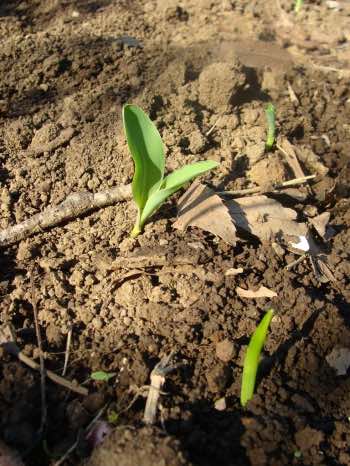
"There is increasing evidence that exposure to plants and green space,and particularly to gardening, is beneficial to mental and physical health."
- Clinical Medicine (PMC6334070)
The broad bean season incidentally also means a big reduction in the tremor in my right hand; it is all about a phytonutrient called L-dopa.
Legumes form an important part of the longevity diet; I will bet Prue's gardener planted them and she is enjoying the benefits too.
And finally harvesting an astonishing amount of fresh, nutritious food much of which is shared with family and friends.
Interestingly new potatoes just lifted out of the ground have about half the digestible starch of those from cold-storage. Even diabetics can often enjoy them provided it's a small portion, with no need to increase their insulin.
Easy composting means our spuds are often covered with butternut vines and easily lost; so we stake them. It also makes it easier to heap them up.
It means forest bathing to restore the spirit; wholesome exercise done out of doors and the joy of not requiring that mother of all tortures, the spinning-bicycle to keep the blood glucose from soaring. Nearly 50% of folk on typical grocery store food suffer from insulin resistance.
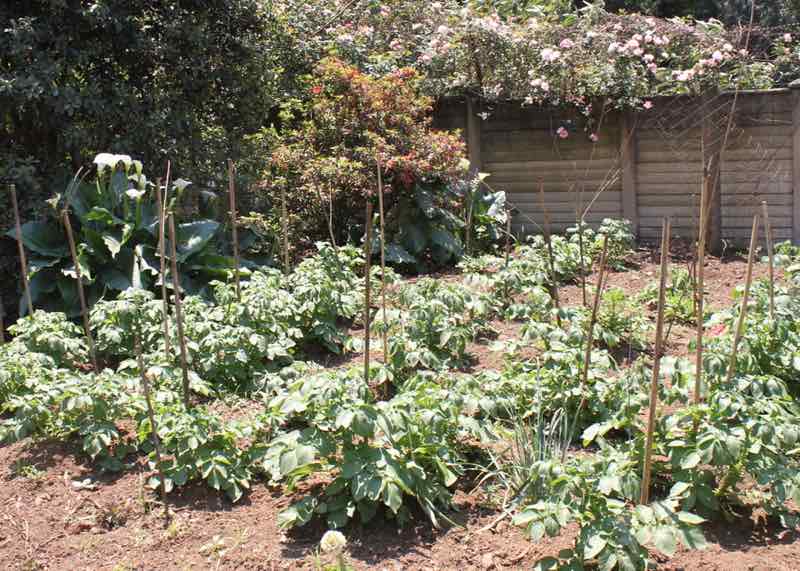
Yesterday I not the serf planted over a hundred peppadew seedlings that the good-wife had reared. Unless there is a catastrophe and it turns out to be all hard work and disappointment, we are in for a bumper crop this year.
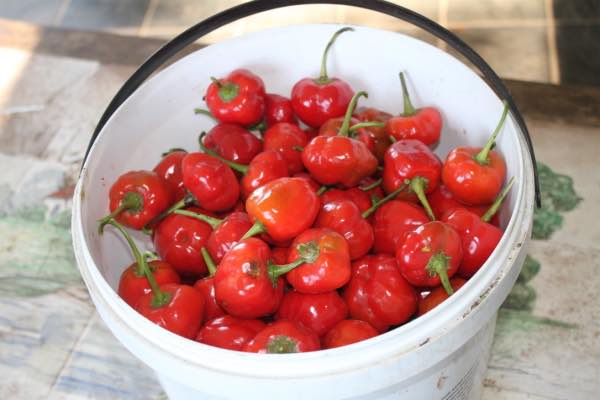
Growing peppadews has been one of the most rewarding vegetables in our garden but they do need to be staked; the plants are so heavy in fruit that they will collapse otherwise and then they don't ripen.
After citrus peppers are the richest source of vitamin C and a powerful anti-inflammatory compound called capsaicin; we give them the credit for how little pain we experience in our muscles and joints.
And today was spectacular; 12 eggs from 14 free-range layers; and darling new chicks from one of the broody hens. That was a first for us.
In a prediabetic world we put a lot of emphasis on food for a healthy pancreas.
Astonishingly raw honey actually lowers fasting blood glucose.
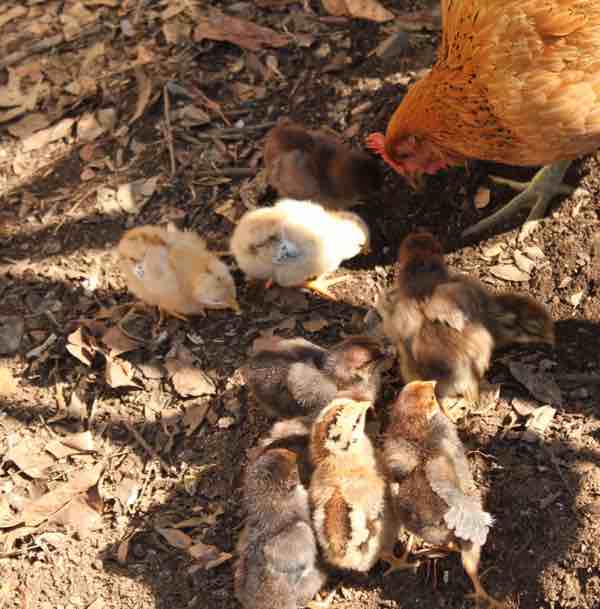
Lucky not to have a gardener
We are lucky not to have a gardener; this essay weighs up the sheer pleasure of having masses of fresh, unspoiled food from all the hard work.
One other not so small benefit is that those who sit over eight hours per day have up to a 50% increase in all-cause mortality[3]; but that can be completely ameliorated by some daily vigorous exercise like gardening.
Yes, it’s hard work; and it does take quite a lot of time but no, we certainly would not welcome a request from Open Gardens. With no serf our backyard is an untidy mess. It does mean not spending hours stuck in front of the TV, in the study at the computer writing books or plying the social media. It is probably the most rewarding and satisfying thing I do.
When the world wearies and society ceases to satisfy, there’s always the garden.
I suspect Prue Leith’s serf did the hard work and got most of the pleasure; fed his family from the excess and was paid for his labours. She was probably given some of the left-overs and all the disappointment!
We are indeed lucky not to have a gardener.
When browsing use right click and "Open Link in New Tab", or you may get a bad gateway signal.
Newsletter
Our newsletter is entitled "create a cyan zone" at your home, preserving both yourself and Mother Earth for future generations; and the family too, of course. We promise not to spam you with daily emails promoting various products. You may get an occasional nudge to buy one of my books.
Here are the back issues.
- Lifestyle and ideal body weight
- What are ultra-processed foods?
- Investing in long-term health
- Diseases from plastic exposure
- Intensive lifestyle management for obesity has limited value
- A world largely devoid of Parkinson's Disease
- The impact of friendly bacteria in the tum on the prevention of cancer
- There's a hole in the bucket
- Everyone is talking about weight loss drugs
- Pull the sweet tooth
- If you suffer from heartburn plant a susu
- Refined maize meal and stunting
- Should agriculture and industry get priority for water and electricity?
- Nature is calling
- Mill your own flour
- Bake your own sourdough bread
- Microplastics from our water
- Alternative types of water storage
- Wear your clothes out
- Comfort foods
- Create a bee-friendly environment
- Go to bed slightly hungry
- Keep bees
- Blue zone folk are religious
- Reduce plastic waste
- Family is important
- What can go in compost?
- Grow broad beans for longevity
- Harvest and store sunshine
- Blue zone exercise
- Harvest and store your rainwater
- Create a cyan zone at your home
Did you find this page interesting? How about forwarding it to a friendly book or food junkie? Better still, a social media tick would help.
- Bernard Preston homepage
- Our green garden
- Lucky Not to Have a Gardener
Address:
56 Groenekloof Rd,
Hilton, KZN
South Africa
Website:
https://www.bernard-preston.com